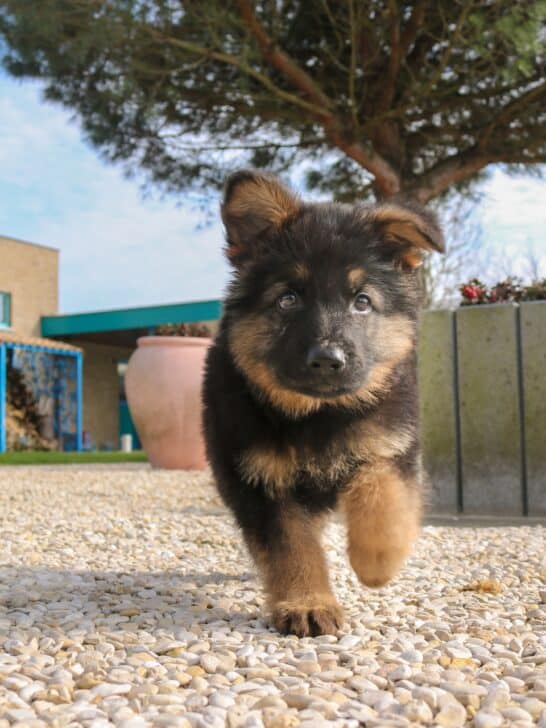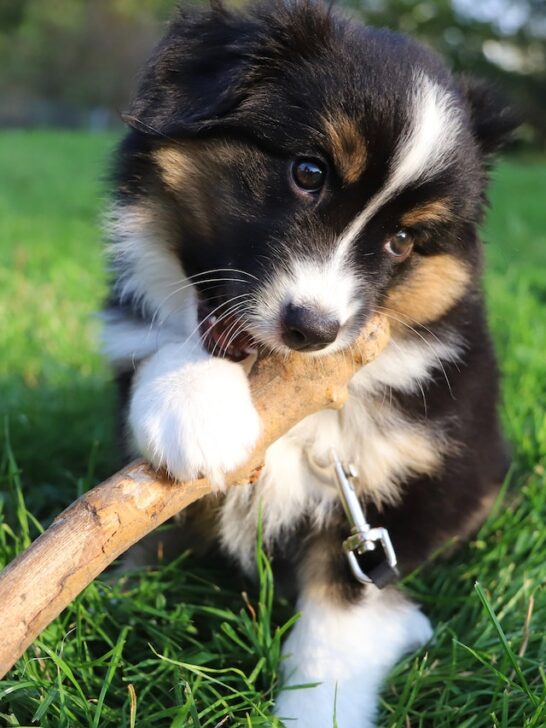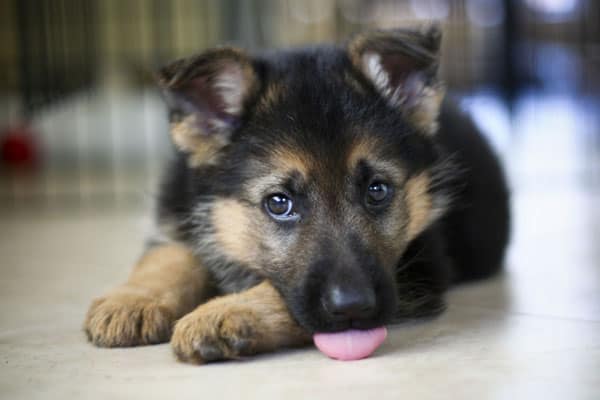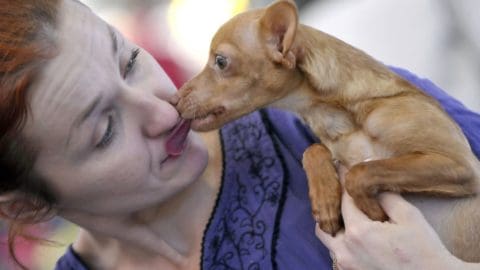Are German Shepherds Good With Kids? A Comprehensive Guide
So, you’re considering welcoming a new canine companion into your family home, and you’re wondering if a German Shepherd would fit the bill. Excellent choice!
Their reputation for being loving, handsome guard dogs is a deserved one.
However – being large, muscular, and fiercely protective dogs, often prospective adopters can wonder whether this breed is too boisterous or aggressive to have around young children.
Today, we’ll be going through all that you need to know to make an informed choice for yourself.
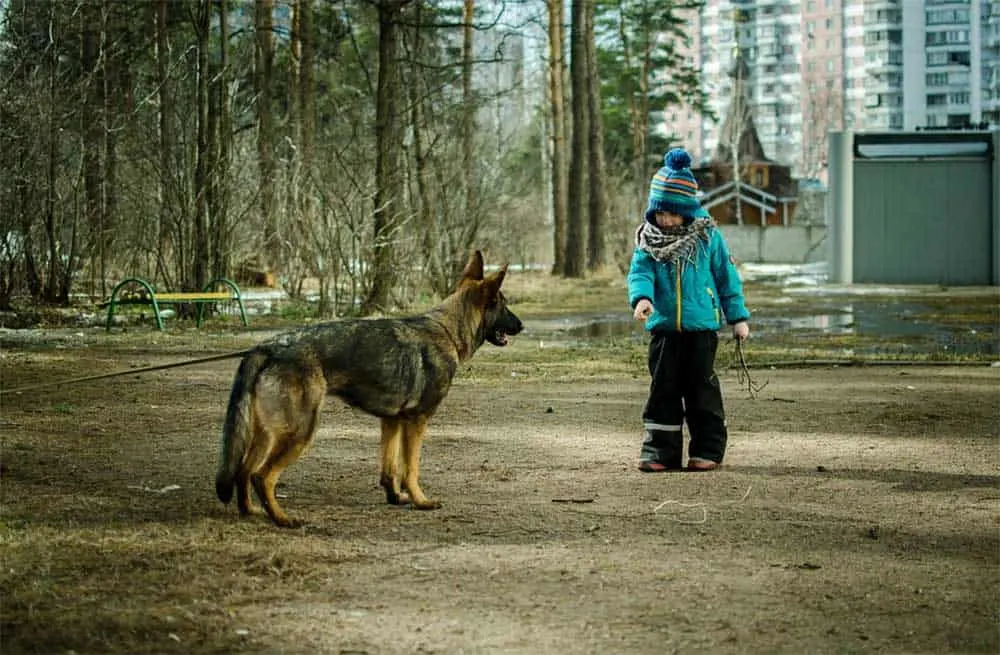
Are German Shepherds Good With Kids? The Quick Answer
To cut a long story short – yes! German Shepherds absolutely can be a fantastic companion to your child, being an incredibly intelligent, compassionate, and loyal breed.
Your kid and newly adopted pup are sure to form a beautiful bond… if, and only if, you make sure to do your due diligence as a responsible pet owner.
That means learning the important facets of the German Shepherd’s personality in a general sense, as well as how best to train your new furry friend and also educating your children on appropriate behavior with a dog in all different types of situations.
In our opinion, there’s no such thing as a bad or dangerous breed…just poor ownership.
Though you can make generalizations about particular breeds and their temperaments, it’s actually the way you and everyone else in your household behave around and treat your dog that determines their behavior.
German Shepherd Breed Characteristics
So, you know these dogs are clever and caring: they are also steadfast and loyal, as well as having been bred to herd since the nineteenth century, which contributes to their superior size, strength, and intellect.
Whilst all of the above traits are desirable in any family dog, they can also result in negative experiences if you fail to understand how a German Shepherd’s mind works from the get-go, or neglect to train them adequately.
First, let’s talk about potential “problems” with their personality:
Loyalty
As already covered, the loyalty of a German Shepherd to their family unit knows no bounds. Very quickly, they will see you as a member of their pack and strive to protect you wherever possible.
This is because they have long been bred to serve as guard dogs for their owners, keeping watch over both humans and their possessions.
Pairing well with their inherent desire to obey orders and a natural cleverness, it never feels like work to them: just what they were born to do.
Unfortunately, though, If you fail to discipline negative behavior and socialize them properly (more on this later!) then you might reinforce the idea that it is okay to bark at or lunge at any human they deem a threat if it’s in the name of protecting you.
They also have a tendency to be somewhat aloof with humans they don’t know, reserving their affection and sweetness for immediate family members and trusted friends they have interacted with enough times to consider safe.
This can be useful to keep them safe from creepy strangers but makes it a little difficult to find care last minute or for them to trust strangers at an overnight kennel, for instance.
Herding
In a similar way, as the name suggests, German Shepherds are also predisposed to herding; they have long been bred to tend to sheep and keep them in line for farmers, with the best and strongest encouraged to reproduce.
This natural instinct can actually be accidentally activated by kids – your dog might suddenly be struck with a desire to run around after your little ones and herd them, for instance, or give them a little nip to get them to stop misbehaving.
They won’t mean any harm here at all, so there’s no need for punishment – rather, they are simply attempting to keep the children “safe” and away from potential hazards, because of their ingrained behaviors.
Again, the solution here is proper training, which we will go into in a second.
As long as you are aware of this potential behavior, you’re much more likely to put a stop to it by preventing the desire from forming into a habit as soon as you notice the signs.
Size & Strength
German Shepherds are a medium to large breed, so they can get pretty hefty once fully grown.
Reaching from 22 to 26 inches tall, with an average weight of 50 to 90 lbs, they’re more than capable of knocking over a grown man, never mind your children.
Though they’ll be tiny and adorable at first if you get them as a puppy, the transition to becoming a big cuddly giant is a quick one that starts suddenly, out of the blue.
Without enough exercise each day, all of the energy they possess will very quickly become a problem for your children, especially if they naively engage them in a bit of playtime before their daily walk.
That being said, you could also argue that a larger breed of dog is actually better in a house with especially small kids – they’re much less likely to be a trip hazard, and it’s also said that small breeds are naturally more aggressive or likely to snap.
Energetic Temperament
Not only do German Shepherds grow up pretty big, but they are also full of boundless energy that needs to be expended.
When you throw kids into the mix, a big dog that hasn’t had a nice long walk is going to be far too over-excitable, so it’s important to make sure they get their daily exercise.
An hour is plenty of time, particularly if they get the opportunity for a good run-around off leash (provided they are properly recall trained, of course) or a few rounds of fetch.
This is the perfect opportunity to safely get the kids involved in play with a German Shepherd, too – in an environment outside of the home where they are less likely to be at risk of injury.
Not only will this result in a calm dog that’s ready to chill for the rest of the day, but it will also prevent any destructive or negative behaviors that can occur from a lack of stimulation and exercise, like chewing furniture or knocking over your children like bowling pins when they try to play.
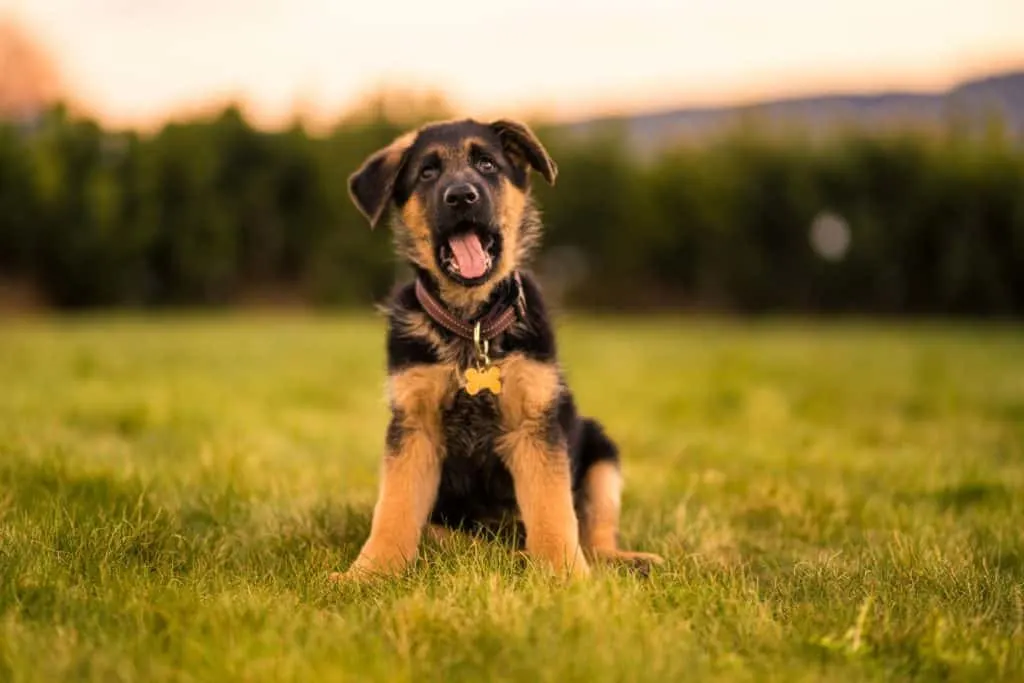
The Importance Of Puppy Training
To give your German Shepherd the best chance of being a well-behaved, obedient member of the family, you need to ensure they begin training as a puppy, once they’ve reached an appropriate age of course.
Whether you feel confident to take that on yourself or believe you’d benefit from the assistance of a training school is up to you.
This primarily involves socializing your pup with both other humans and fellow canines, so they get the right amount of exposure to and interaction with strangers.
As we’ve already explained, a German Shepherd will likely bond with you and your family very quickly, but because of their instinctual need to protect you, may also then be wary of humans or animals they’re not familiar with.
Some dogs will demonstrate this apprehension by merely acting aloof to those they perceive as a potential threat, whereas others might become aggressive or try to bite and snap.
This demonstrates the importance of early training: the quicker you intervene and put a stop to any signs of these behaviors, the more likely you are to succeed at ensuring your dog behaves appropriately around other dogs and new humans.
The best time to begin training your puppy is as soon as you bring them home, though if you’re lucky enough to have one from birth, between four and twelve weeks is the optimum point at which to begin socializing, though remember your pups can’t go out for a walk until they have had all of their vaccines!
Your goal here is to teach them that other people and dogs are not a threat, and can in fact be great company. Here are some top tips for success in human and animal socialization:
- Walk in different places, regularly: that daily walk is some of the most important socialization your pup is going to get. From strange loud noises like traffic to screaming kids and teenagers careering past on bikes, as well as a whole host of smells, your outdoor adventures will work wonders for training your dog to feel safer in new situations. Hiring a professional dog walker when you aren’t able to walk your pup, or asking a trusted friend or family member to fill in, is equally as important – pent up energy leads to a naughty puppy!
- Follow your dog’s lead: if they get freaked out and upset, remove them from the situation before they can react badly, calm them down and try again, but ensure to keep these interactions entirely on their terms. Be cool and calm, though, especially if they get scared – don’t give up just because they seem hesitant, as this might accidentally teach them that they are in charge of where you go and what you do!
- Hang out with different demographics: that goes for dogs and people! Make time to interact with a variety of large and small breeds, adults and kids, being sure to include people of all colors and creeds. If you only ever spend time with one dog or person, they will become accustomed to them specifically and not pups or humans generally speaking, which is mostly just asking for trouble.
- Use treats and toys!: dogs are very similar to kids, in that they both respond a lot better to positive reinforcement and reward than punishment or negative consequences. That’s not to say let them walk all over you or avoid punishing bad behavior, but you should definitely try to make a point of rewarding good behavior and obedience. Essentially, you’re ethically taking advantage of the fact that most pups will do just about anything for their favorite treats or a shiny new toy to play with.
- Check out the dog park, but proceed with caution: using strangers down at the park can be a great way to test your German Shepherd’s new skills, but only go when you’re confident of your dog’s ability to listen to commands. Likewise, you should not approach a stranger or their dog before you have ascertained they are friendly and don’t mind saying hello themselves. The more successful meet and greets you can facilitate early on, the better!
- Don’t be afraid of obedience school: listen, training a puppy is no picnic for anybody – even those who have done it before can struggle, because every dog is different in some ways. Do some research and ask fellow dog owners for some recommendations of good classes in your area, then make sure to attend every week. If you’re struggling, don’t worry – you’ll get there in the end, just keep at it! There’s no such thing as an untrainable dog.
Children And Dogs – How To Encourage A Healthy, Safe and Loving Bond
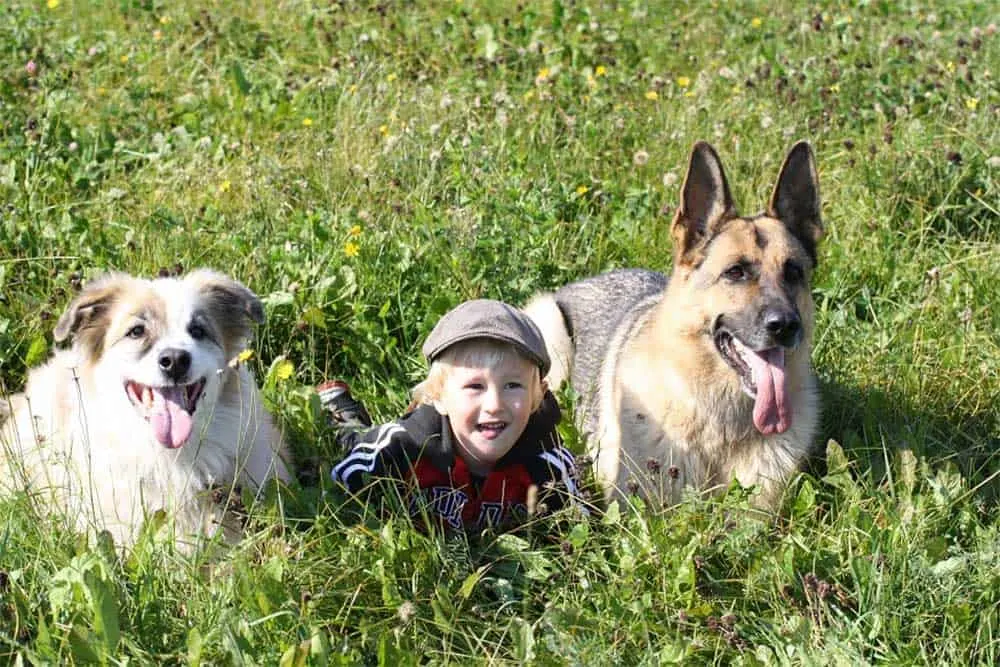
When it comes to kids and canines, particularly young kids and a large protective breed like a German Shepherd, it’s important to remember that the onus is not just on your dog to make sure that everything goes swimmingly.
Both you and all the other members of your family have a responsibility to interact with your dog properly and encourage the right sort of behavior all the time, not just when others are watching.
The first and most important point to stress is this: you should never leave a puppy alone with a child, particularly an untrained one.
Either your kid or the puppy could do something they are not supposed to, causing unpleasant or even deadly consequences.
Whatever you want to do in that “split second” you were away can wait until another responsible adult is around to take over the supervision.
Here are some more key areas to focus on, which will help foster an appropriate relationship that will be as much benefit to your furry friend as it is sure to be for your children:
Training/Commands
Kids are very kind, but they are also cunning and mischievous: when it comes to a cute little puppy, of course they are more likely to let them up onto furniture they are banished from, encourage rough playtime or sneak food off of their plates to their new best friend.
It is important that before your German Shepherd even joins the family, you make your children (who are old enough to understand, obviously) aware of what behavior is and is not acceptable around and with the dog.
You should also remind them to use the same command words and follow the same routine and schedule you establish for your dog, like letting them out to pee with regularity and dishing up their food at the right times every day, and not straying from these boundaries.
Dogs thrive on routine and familiarity, so don’t throw your training away and make sure the kids are doing as they are supposed to as well!
Affection
In the same way you do for humans, it is important for you to teach your children about consent with animals. Sometimes, we don’t want to be touched or cuddled, and that is okay!
Your kids must learn the same goes for a German Shepherd, especially one that’s a lot bigger than them and could do some serious damage if provoked.
Likewise, when they are in the mood to be petted, children should be taught how to do so in a gentle, appropriate way that your dog enjoys.
Point out areas where your dogs might not want fuss, like around their tail and paws – this is particularly important to explain to younger kids, who don’t always realize just how heavy handed they are being.
You should also teach them key signs that the pup isn’t enjoying the affection they are giving, like turning their head away or moving away from them entirely, emitting a low warning growl or otherwise showing a lack of interest in what is going on.
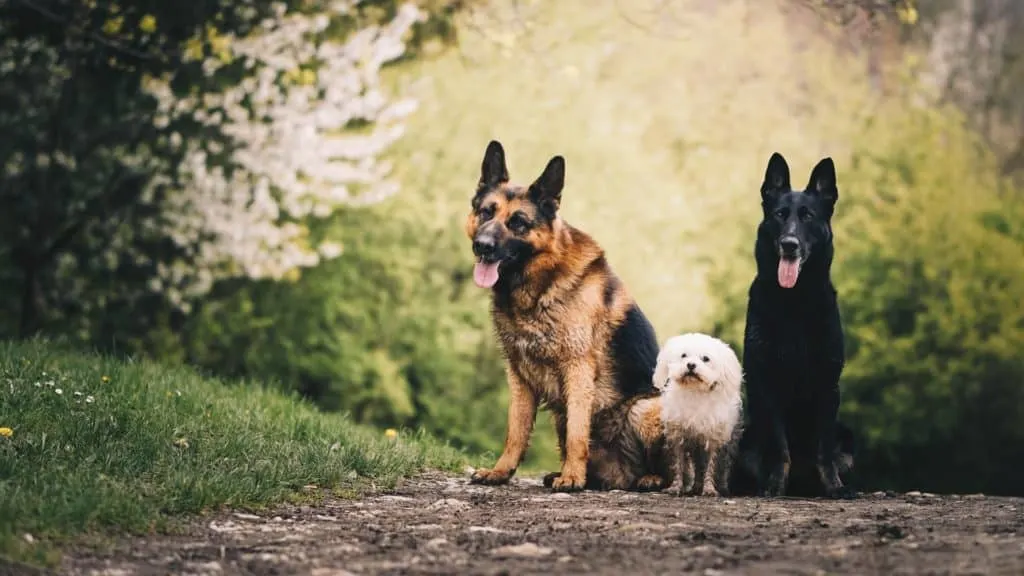
Caretaking
As important as it is to teach your kids what not to do, you should also show them how best they can help you take care of the dog, as they are a member of the family after all.
There are several ways you can safely involve them in dog care!
Again, just remember the golden rule of full supervision at all times, just in case anything should go wrong – dogs are unpredictable creatures and so are kids, so leaving them on their own together is asking for trouble!
One way to encourage the bond between dog and child and also have the kids assist you with a chore is to ask them to help you with grooming.
German shepherds have long, thick coats that benefit from regular maintenance; of course, you should go in there first and get at any knots or problem areas, but once the potential hazards are out of the way, kids are more than capable of gently brushing if you show them how.
Another is having them join you on some of the daily walks, achieving the double whammy of making sure you all get some outside time away from screens or technology, and the kids get to help you socialize your dog, who will also be very happy for their company.
You could also use mealtimes as an important lesson about portion control and eating the right foods for our tummies all in one, by teaching those old enough how to feed the dog.
Be sure to show them exactly how much is too much, and always be around to see what ends up being served!
Though involving your kids in picking up poop is dangerous because of the infection risk, you can have them help vacuum or sweep up the dog hair – German Shepherds have a tendency to shed fur all the time, so you will be doing a lot of this.
Kids that are old enough could have tackling the dog hair added on to their weekly chore list, to prove their commitment to taking care of the puppy they definitely begged you for.
Proper Playtime
Much as you need to teach them about appropriate cuddling and touching with your German Shepherd, kids should also be told how to play, or more importantly, how not to play with the latest addition to your family.
From a game of fetch or frisbee in the yard or at the park to a good old roll around on the floor, a little rough and tumble won’t hurt anybody… so long as you’re always watching, and the kids know of the signs to watch out for that signify your pup has gone from playing to fighting or defending themself.
In the same way we don’t like to be teased or picked on, dogs also don’t appreciate aggravation – especially when they don’t know any better about reacting badly.
Teach your children that your dog will only take so much keep-away before they’ll get angry and begin fighting for their toy back, and that they should not yank or snatch to prevent accidentally injuring your pup’s mouth, head or neck.
If your dog gets angry and lashes out at your child because they were provoking them, then it’s the kid’s fault and your dog hasn’t really done anything to deserve punishment.
Teaching proper playtime, as strange and anti-fun as it sounds, is the best way to ensure that your children and beautiful new German Shepherd will make a lifetime of beautiful memories.
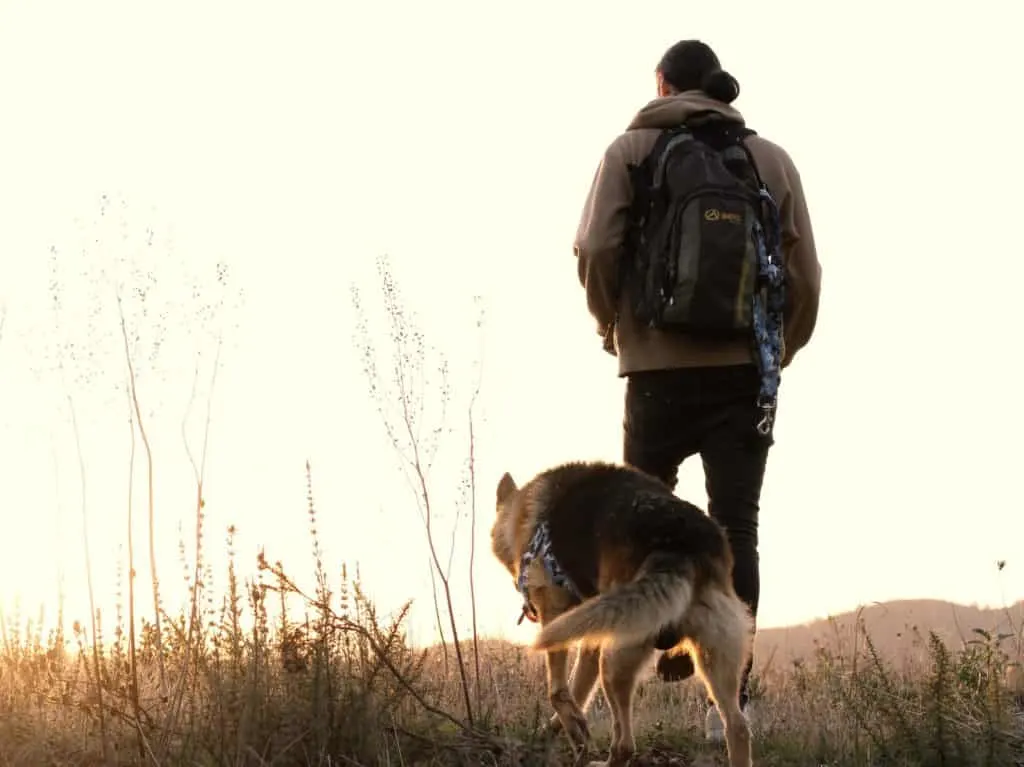
German Shepherds And Kids – What Not To Do
Okay, so you know those absolutely adorable photos and/or you’ve seen all over social media, where a tiny little baby is lying on top of or right next to the giant jays of a dog?
Yeah, don’t do that. No, seriously, it’s a really bad idea.
Sure, a quick photograph might not hurt, but even the softest dogs with the sweetest temperaments have the ability to go from sweet to sour in a matter of seconds if they feel threatened, get hurt or something happens that they just don’t like.
The likelihood of one of those things occurring is tripled when you throw a tiny baby or even a toddler into the mix, as they have much less threshold for stopping and thinking about their actions before proceeding to, say, yank on a dog’s tail.
Avoid any interaction wherein you aren’t able to immediately remove your child from a potentially harmful situation, remembering a lot can happen even in five seconds.
Maybe you don’t get a million likes, but your kid’s face stays on and not ripped off.
“But you said they’re a protective breed!” we hear you shouting at the screen, and we hear you.
Yes, a German Shepherd will take care of your family the best way they can, and protect your children from any perceived threats after very little time of being in the family.
But, if their natural instinct to protect themselves is provoked, your child being their beloved best friend won’t stop them from getting angry, especially so the younger and less well-trained they are.
It doesn’t matter how much trust you have in your dog – there is no way of knowing what they will do at all times, unfortunately.
It’s also important to remember, too, that children are likewise unpredictable and have a tendency to do things they shouldn’t, particularly when they are under the age of ten.
Toddlers and babies in particular can’t really understand the concept of pain and not causing it to their furry friend – all they think about is how soft their fur feels, and how good it might taste to put an ear in their mouths.
To make sure no boundaries get crossed, always be prepared to step in if either your dog or your child goes too far. The importance of supervision when kids and animals are concerned simply cannot be overstated!
This last tip goes for all dogs, but particularly German Shepherds, who are territorial around food.
Do not let your kids approach them for any reason whilst they are eating, because they will perceive it as your child trying to steal their meal, and they will do something about it.
Heed this advice to avoid unnecessary injury and upset!
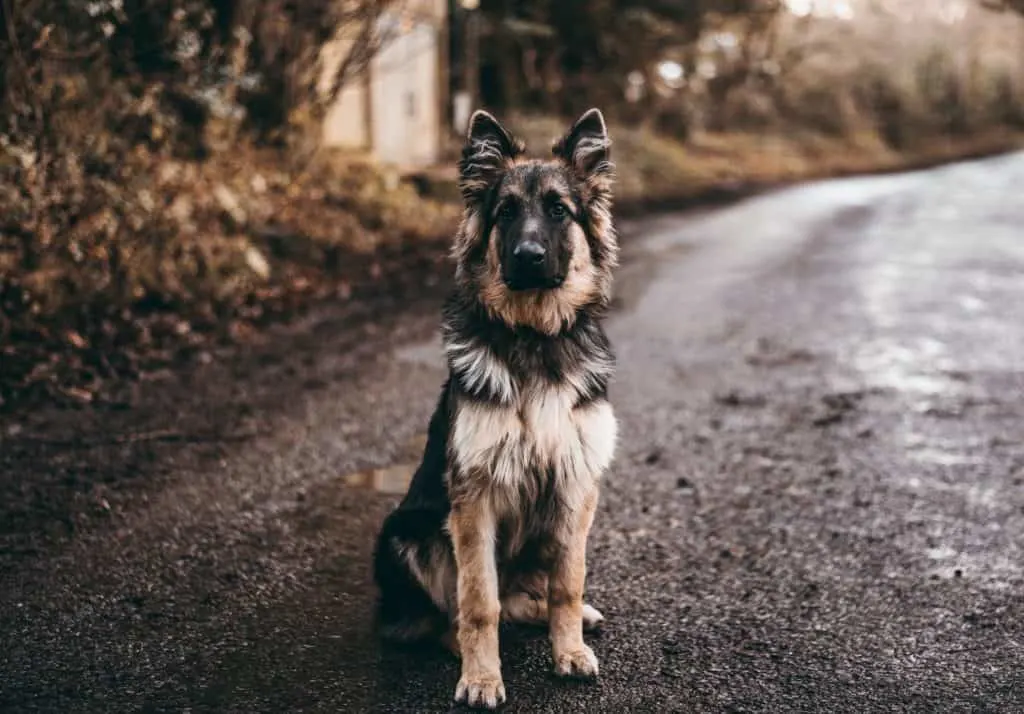
In Conclusion…
So, you’re pretty much ready to go on making sure that your children and a potential new BFF have a fantastic start to their relationship.
It’s really important you follow through on all of the advice and training suggested, and keep it up with regularity to ensure your dog and the kids get used to how things are going to be.
Both will benefit from routine, structure and firm but fair behavior. Let the kids help out with doggy care, holding the lead on a walk now and then.
Allow them to have a cuddle on the sofa once in a while. Just set boundaries and stick to them!
























